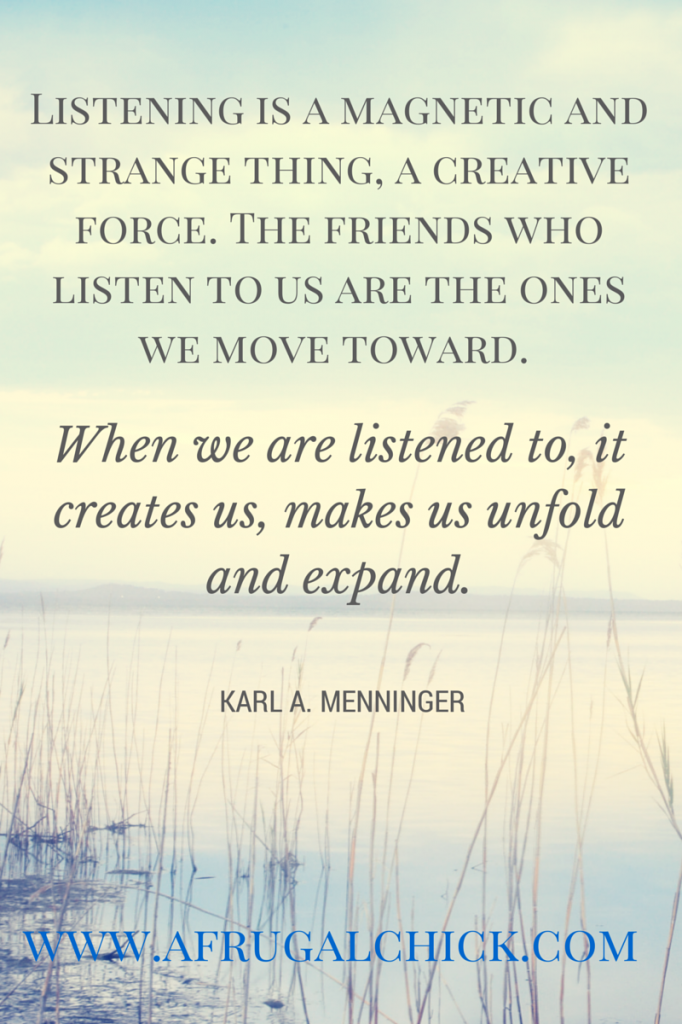
Most people are terrible listeners. I often wonder how good I am at it. I really do try. And I hate to think of the opportunities I miss due to being unaware of someone’s need to talk.
Because while I don’t always know when I need to listen I KNOW when I need to talk.
I suffer from Seasonal Affective Disorder [1]. When it gets dark and gloomy outside I start to get dark and gloomy inside. It’s actually a pretty common thing and this time of year is when it hits people the worst because of time change. I’ve gotten very good at combating it with vitamins, prayer/meditation, exercise and time outside in the sun but last week it was cloudy almost all week long and I just couldn’t shake it. When that happens my last line of defense is to talk to someone about it.
I just needed someone to REALLY listen to me. Like we all do sometimes.
After a few failed start ups with people who were too busy, wouldn’t put down their cell phone or whose kids wouldn’t leave us alone for 30 seconds I figured out the right person. It only took a 40 minute phone conversation with a friend to get me back on track and days later the positive affects are still being felt.
At some point in my life the term “active listening” was added to my vocabulary. I think it was probably in one of my business classes talking about interviewing and managing employees. It totally changed my opinion of what listening was- to really be engaged with someone means to take part in the conversation without actually talking. To be fully devoted to what is being said with no agenda or distractions on my end.
A friend met my need this week and I want to try to pay it forward to someone else who might have the same need.
So as I try to be more aware of those around me who need a friend’s ear here are the steps I (and maybe you) can take in becoming an active listening friend:
1. Put away distractions. A friend who I had not seen in months was cleaning their kitchen Monday night while I was sitting in it trying to talk to them. Others were checking e-mail or the good looking people around us. I want to be sure that when someone is really expressing themselves to me I give them my full and undivided attention. The phone can be muted and tasks like cleaning and laundry can wait.
2. Make eye contact and watch body language. Sometimes, with my very good friends, I can tell as soon as I see them what kind of day they are having- and they haven’t even opened their mouth yet. I want to be better at finding non-verbal cues- looking and listening combined is better.
3. Figure out if they want advice or just a listening ear. I STINK at this. I like to solve problems. One of my dearest friends says she only calls me when she wants a solution- she has a more emotional friend she calls if she needs someone just to listen. I struggle with sitting on my hands and letting people learn from mistakes. It’s hard to remember that not everyone wants advice.
4. Make some noise and ask open ended questions. When I am listening I tend to sit in total silence and concentrate. One of my friends often says “are you still there?” while we are on the phone because I don’t make any noise. I have to make a conscious effort to say “uh huh” or “yep” and remind people I am engaged with them. I also need to work on my open- ended questions. One of the reasons the phone conversation with my friend got me back on track was because she asks things like “how did you feel about this” and “what changes would you like to see?” She forces me to look at things for myself and solve my own problems.
5. Remember and follow up. It only takes a few seconds to drop someone a text and see how they are doing a few days after you talk. I want people to know that my conversations with them are important and they have impacted me as well. A text or a short note in an e-mail can make all the difference in the world.
At the end of the day, it’s really more about giving a person your presence and not your advice. Sometimes just being there is the best medicine.
Want to read more? Check out The Relationship Between Truth and Love [2].